Space
Sign up for our newsletter
We summarize the week's scientific breakthroughs every Thursday.
-
 Astronomy
AstronomySupernova hurls star out of the galaxy
The fastest-moving star to leave the Milky Way might have been launched by a nearby exploding star.
-
 Astronomy
AstronomyHubble telescope sees quadruple
A galaxy bends light to create four images of the same supernova.
-
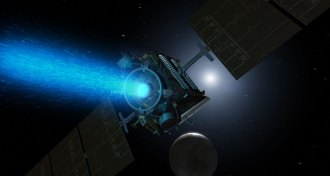 Planetary Science
Planetary ScienceDawn spacecraft on final approach to Ceres
Dawn gets ready to enter the first orbit of its 14-month visit to the dwarf planet Ceres.
-
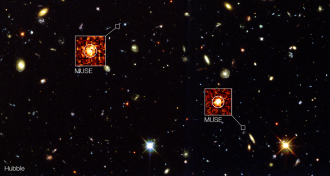 Astronomy
AstronomyHundreds of galaxies seen in a new 3-D view of the universe
A new instrument lets astronomers measure the distances to hundreds of galaxies at once, looking back across the age of the universe.
-
 Quantum Physics
Quantum PhysicsTrying to get the down-low on gravity
A twist on a classic quantum mechanics experiment could lead to the discovery of elusive gravitons.
By Andrew Grant -
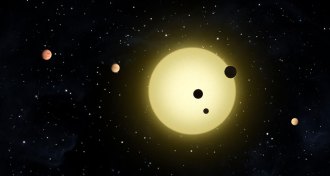 Astronomy
AstronomyPlanet collisions may have rearranged crowded solar systems
Solar systems discovered by Kepler with just one or two worlds may be remnants of planet families that were once far more crowded.
-
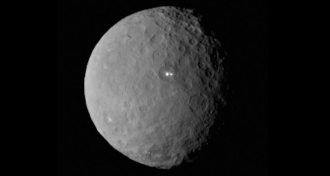 Planetary Science
Planetary ScienceMysterious bright spot on Ceres has a partner
A new image from the Dawn spacecraft finds two bright patches within a basin, possibly caused by an ice volcano.
-
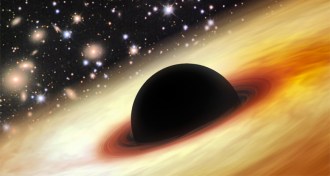 Astronomy
AstronomyMonster black hole lurks in the early universe
A black hole weighing the same as 12 billion suns is the most massive one known in the early universe.
-
 Earth
EarthWater’s unclear origins, shaky solutions to climate change and more reader feedback
Readers discuss the pitfalls of carbon storage, whether a recent movie got Alan Turing's story right and more.
-
 Oceans
Oceans‘Ocean Worlds’ chronicles the story of water on Earth and across the cosmos
Jan Zalasiewicz and Mark Williams recount the history and predict the future of Earth’s oceans.
-
 Planetary Science
Planetary ScienceSpace simulations of 1960s focused on survival
50 years ago, space simulations focused on survival. Now, quality of life is critical, too.
-
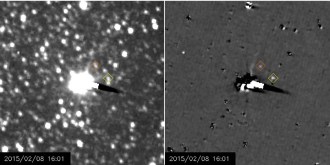 Planetary Science
Planetary ScienceNew Horizons spies two of Pluto’s moons
Nix and Hydra come into view on the 85th anniversary of Pluto’s discovery.